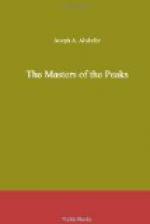“It cannot be doubted, Great Bear. Montcalm and his captains sat on the log. The Indian chiefs sat in a half circle before it, and they smoked a pipe. See, the traces of the ashes on the grass. They were planning the attack upon the fort. It is bound to be William Henry, because the trail leads in that direction.”
“And these marks on the log, Tayoga, show that there was some indecision, at first, and much talking. Two or three of the French officers had their hunting knives in their hands, and they carved nervously at the log, just as a man will often whittle as he argues.”
“Well stated, O, Great Bear. After the conference, the chiefs went back in single file to their own part of the camp. Here goes their trail, and you can nearly fancy that all stepped exactly in the footprints of the first.”
“The straight, decisive line proves too, Tayoga, that the plan was completed and everything ready for the attack. The chiefs would not have gone away in such a manner if they had not been satisfied.”
“Well stated again, Great Bear. The Marquis de Montcalm also went directly back to his tent. See, where the boot heels pressed.”
“But you have no way of knowing,” said Robert, “that the traces of boot heels indicate the Marquis.”
“O, Dagaeoga, after all my teaching, you forget again that mind can see where the eye cannot. Train the mind! Train the mind, and you will get much profit from it. The traces of these boot heels lead directly to the place where the largest tent stood. We know it was the largest, because the holes left by the tent pegs are farthest apart. And we know it belonged to the Marquis de Montcalm, because, always having that keen eye for effect, the French Commander-in-Chief would have no tent but the largest.”
“True as Gospel, Tayoga,” said the hunter, “and the French officers themselves had a little conference in the tent of the Marquis, after they had finished with the Indian chiefs. Here, within the square made by the pegs, are the prints of many boot heels and they were not all made by the Marquis, since they are of different sizes. Probably they were completing some plans in regard to the artillery, since the warriors would have nothing to do with the big guns. Here are ashes, too, in the corner near one of the pegs. I think it likely that the Marquis smoked a thoughtful pipe after all the others had gone.”
“Aye, Dave,” said Robert, “and he had much to think about. The officers from Europe find things tremendously changed when they come from their open fields into this mighty wilderness. We know what happened to Braddock, because we saw it, and we had a part in it. I can understand his mistake. How could a soldier from Europe read the signs of the forest, signs that he had never seen before, and foresee the ambush?”
“He couldn’t, Robert, lad, but while countries change in character men themselves don’t. Braddock was brave, but he should have remembered that he was not in Europe. The Marquis de Montcalm remembers it. He made no mistake at Oswego and he is making none here. He took the Indian chiefs into council, as we have just seen. He placates them, he humors their whims, and he draws out of them their full fighting power to be used for the French cause.”




